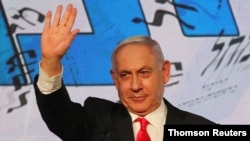Iran’s Islamist rulers have remained silent on the uncertain electoral fate of Benjamin Netanyahu, prime minister of their top regional enemy, Israel, making no public statements and signaling no preference in whether he stays in the role or is replaced.
With almost all the votes counted from Tuesday’s election for Israel’s parliament, or Knesset, neither Netanyahu and his allies nor his opponents have an obvious path to forming a majority coalition of at least 61 seats in the 120-seat assembly.
Iranian state media internet sites carried no statements by officials about Israel’s post-election stalemate by late Thursday, and no commentary about whether an ultimate victory either for Netanyahu or his opponents would affect the Islamic republic’s decades-old enmity toward the Jewish state and calls for its destruction.
Iranian news sites
Iran’s state-approved news sites did publish dozens of articles in Farsi with details of the Israeli election results, citing Israeli and other foreign media. Many of them were sharply critical of Netanyahu, highlighting his ongoing trial for corruption charges and asserting that he was trying to distract attention from that issue by campaigning on his recent achievements, such as leading Israel’s rapid coronavirus vaccination drive and establishing relations with four Arab states last year. The articles also maligned traditional allies of Netanyahu’s nationalist Likud Party, describing the other nationalist and religious parties that may join him in a new coalition as extremists.
Iranian state media also noted that the leaders of Israel’s anti-Netanyahu parties were planning to introduce legislation that would bar the long-serving prime minister from seeking office again if the political stalemate is not resolved and Israel has to hold a fifth consecutive early election later this year. But none of the articles expressed favoritism toward any of the anti-Netanyahu party leaders or suggested that any of them could be better for Iran if they become the next Israeli prime minister.
Of the four English articles published by Iranian state-approved media about Israel’s election outcome by late Thursday, only one made a tangential reference to how the results may affect Israel’s approach to Iran. The article published Wednesday by the Iranian Labor News Agency ended with a paragraph saying a potential new Netanyahu government including “ultranationalist” parties would be at “loggerheads” with U.S. President Joe Biden’s effort to revive diplomacy with Iran related to the Iranian nuclear program.
Netanyahu has denounced the 2015 Iran nuclear deal under which Tehran promised to curb nuclear activities that could be weaponized in return for sanctions relief from world powers. The U.S. agreed to the deal, called the Joint Comprehensive Plan of Action, under former President Barack Obama for whom Biden served as vice president. But Washington withdrew in 2018 and began tightening sanctions on Iran under Obama’s successor, Donald Trump, who, like Netanyahu, viewed the deal as not doing enough to halt Iranian activities deemed malign. Iran began violating the JCPOA’s nuclear curbs in 2019 in retaliation for Trump’s moves.
Since taking office in January, the Biden administration has appealed to Iran to enter talks on how to coordinate a mutual U.S. and Iranian return to JCPOA commitments. Netanyahu has not criticized Biden’s policy directly, but U.S. news site Axios quoted him earlier this month as telling a campaign event: “There is an intention to go back to this dangerous deal. I am the only one who will stand against the entire world."
Netanyahu and other senior Israeli officials long have refused to rule out military action to stop Iran from developing nuclear weapons, which they view as a threat to Israel’s existence. Tehran has denied Israeli and Western suspicions that it seeks to weaponize its nuclear program. Netanyahu also has struck back militarily against efforts by Iran and its proxy militias to entrench themselves near Israeli borders and attack Israeli territory. At the same time, Israeli leaders have expressed a desire to return to the friendly Israeli-Iranian relations that existed prior to Iran’s 1979 Islamic Revolution.
“Israel is regarded in the Iranian state media as a whole [political entity],” said Netanel Toobian, an independent Israeli researcher of Persian-language media. Speaking to VOA Persian on Monday from Tel Aviv, Toobian said Iran’s news sites frequently demonize Israel and give no special or positive treatment to any particular Israeli leader.
“Dealing with Iran’s threats toward Israel is a consensus issue for Israeli political parties,” Toobian said. “No matter which parties will be in power, this threat is regarded as very serious, and one can expect that (those parties) dealing with it will do so accordingly.”
More focused on Washington
With Netanyahu remaining in office at least until the end of a coalition-building process that could take weeks or months, Israeli political developments are unlikely to have a major impact on Iran’s decision-making, according to Thamar Gindin, an Israeli researcher of Iran studies at the University of Haifa. “I don't see why the Islamic republic would do now things that it didn't do before,” she told VOA Persian on Wednesday. “It’s the same Netanyahu [who is in charge].”
Iran’s attention is more focused on Washington than on post-election political maneuvering in Jerusalem, Israel’s U.S.-recognized capital, in the view of David Menashri, an Israeli professor of Iranian studies at Tel Aviv University. Speaking Wednesday with VOA Persian, Menashri said Iran’s behavior toward Israel will be at least partly a byproduct of Tehran’s own maneuvering with the Biden administration, which has reiterated a long-held U.S. commitment to the security of Israel, a key U.S. ally.
“The Iranians know that they cannot do harm to Israel or start openly fighting with Israel if they want to negotiate with the United States,” Menashri said. “So, I think the issue of Israel is a footnote to the larger question of Iran's attitude toward Washington and relations with the West.”
Iran has rejected proposals for low-level talks with the U.S., insisting that Biden remove sanctions imposed by Trump before it returns to honoring the JCPOA.
This article originated in VOA’s Persian Service.




